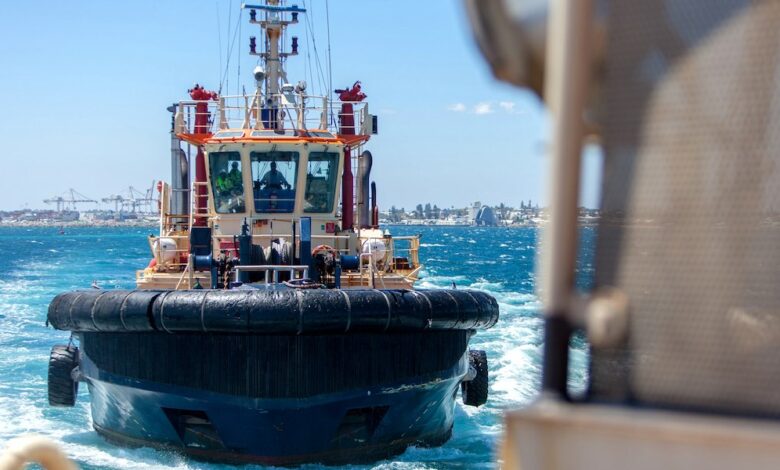Australia braces for chaos as Friday ports shutdown looms

Australia faces its own ‘Ever Given’ moment with shipping – or the potential lack of it – making national headlines this week.
The decision by towage giant Svitzer, a Maersk subsidiary, to lock out staff from Friday over a bitter three-year pay dispute, has alarmed many, with the government weighing in on the issue and calls growing to nationalise the country’s towage sector.
Svitzer is Australia’s largest tug boat operator with 100 vessels deployed in local waters. Yesterday it gave notice of a lockout from Friday indefinitely to all harbour towage employees covered under its 2016 National Towage Enterprise Agreement and their union bargaining representatives, the Maritime Union of Australia (MUA), the Australian Institute of Marine and Power Engineers (AIMPE) and the Australian Maritime Officers Union (AMOU).
This is Australia’s version of the Suez Canal blockage by the Ever Given
Svitzer said it took the decision under the provisions of the Fair Work Act in response to ongoing industrial action being organised by the unions, which has seen strikes become common place at Australian ports.
Svitzer has been bargaining with the maritime unions for over three years, since the towage enterprise agreement expired in 2019.
“Every Australian business and consumer will now suffer from this delinquent company’s selfish and pigheaded conduct,” a release from the Maritime Union of Australia stated in response to the lockout news.
Giving Splash readers some perspective on the severity of the supply chain crisis Australia faces this week, Alison Cusack, principal lawyer at Melbourne’s Cusack & Co, said: “This is Australia’s version of the Suez Canal blockage by the Ever Given.” The six-day blockage of the Egyptian waterway last year by a grounded boxship made major headlines and sparked significant supply chain concerns.
“To have 17 ports, including all of the eastern seaboard containerised ports, non-operational, there is no opportunity to reroute cargo to land-based neighbouring countries such is the challenge of being an island nation,” Cusack explained.
Svitzer’s woes – and repeated industrial action at many ports – have been getting extensive coverage on national TV and in print, with plenty of ‘Christmas cancelled’ headlines.
Further industrial action has been announced by the unions for this Thursday, a day ahead of Svitzer’s proposed indefinite lockout of 590 workers, in addition to extensive ongoing work stoppages.
“Unless this lockout is prevented, impacted parties and their insurers will need to consider whether or not any losses from lockout are recoverable under marine insurance policies which apply to the shipment of relevant goods, and whether they can be excused from performing contractual obligations as a result of force majeure,” an update from local law firm Mills Oakley has advised.
Australia’s workplace relations minister Tony Burke has urged Svitzer to hold off on locking out its workers until new laws to arbitrate “intractable” industrial disputes are in place.
Burke told 2GB Radio shutdowns “[don’t] just affect the people who work there; it affects the people at the ports, it then affects the truck drivers, it affects people at the warehouses and ultimately you end up shopping at Christmas time and what you need on the shelves isn’t there”.
Burke said that the government’s industrial relations bill would give the Fair Work Commission the power to arbitrate “intractable” disputes, something he hoped would be in place within three weeks.
“I’m hopeful we’re only two or three weeks away from that being law. I wish the company could just pause and take breath and wait for those laws to be in place,” he said.
New South Wales transport minister, David Elliott, has said he will hold urgent talks with Svitzer, warning that “we can’t live in a society where our entire nation’s trade is paused because the union wants to dictate to an employer who can get a job”.

A sad day and an indictment on both parties particularly given when the Australian Towage Industry once upon a time was Australian owned and managed and yes disputation and strikes took place but ultimately resolutions took place and were resolved (and that is the Unions did not necessarily win !!)The market place in Australia today is different with various operators working under their own conditions (which suit both employer and employee)and although once upon time managed by major Australian Companies ,the Unions today under aged Union Leaders see their influence waning ( albeit with a Nelson Eye to the former)now like the Waterfront Reforms seek a desperate last stand when Switzer look for something similar to their competitors.regards Michael
Cruise vessels able to moore without tugs.
Quite true but look at their bow /stern propulsion systems.All fine until something goes wrong and they yell for help !! Sadly the tug operator has gone away but then is held responsible because he should have been there just in case!! Ditto car carriers etc etc Michael
Indeed tugboats are always required,just sad no happy medium can be reached between employer and ship crew.
Maybe greed from both sides?
As a retired ocean going salvage tug engineer i understand importance of Tugs.
Australian seafares dont have a sound reputation in the past.
Sometime extreem conditions demand brake the towline.
Companys are there to make money,in my time worked hard cannot recall any issues under Dutch flag vessels.
Quite simple really.
If they don’t like their job and pay, go find another one.
Seafarers are notorious for strikes and have cost me personally a lot of money.
Why should the Union dictate who gets employed? an employer should always have the first and last say on who they employ, end of story.
Agree